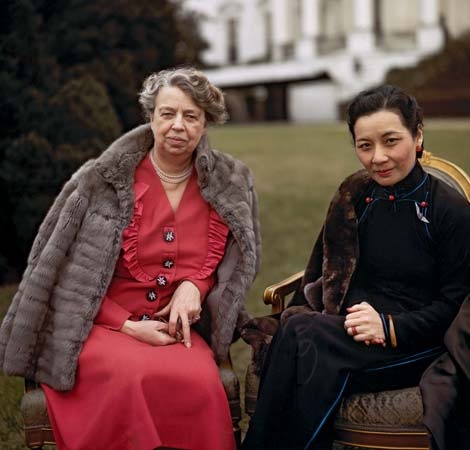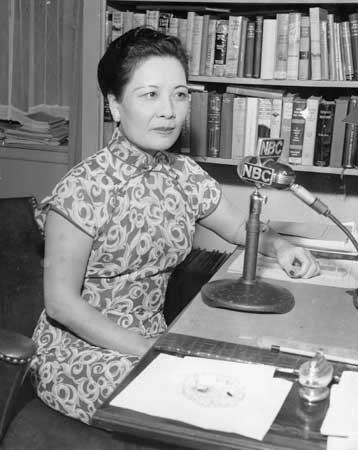Soong Mei-ling
Chinese political figure
Soong also spelled Sung, Mei-ling also spelled Mayling, also called Madame Chiang Kai-shek or Chiang Mei-ling
born March 5, 1897, Shanghai, China
died Oct. 23, 2003, New York, New York, U.S.
 notable Chinese political figure and second wife of the Nationalist (Nationalist Party) Chinese president Chiang Kai-shek. Her family (Soong family) was successful, prosperous, and well-connected: her sister Soong Ch'ing-ling (Song Qingling) was the wife of Sun Yat-sen, and her brother T.V. Soong (Soong, T.V.) was a prominent industrialist and official of the Nationalist Chinese government.
notable Chinese political figure and second wife of the Nationalist (Nationalist Party) Chinese president Chiang Kai-shek. Her family (Soong family) was successful, prosperous, and well-connected: her sister Soong Ch'ing-ling (Song Qingling) was the wife of Sun Yat-sen, and her brother T.V. Soong (Soong, T.V.) was a prominent industrialist and official of the Nationalist Chinese government.Soong Mei-ling was educated in the United States from 1908 to 1917, when she graduated from Wellesley College, and was thoroughly Americanized. In 1927 she married Chiang Kai-shek, and she helped introduce him to Western culture and ideas and worked to publicize his cause in the West. With her husband, she launched in 1934 the New Life Movement, a program that sought to halt the spread of communism by teaching traditional Chinese values. In 1936 Chiang Kai-shek was taken captive by Chang Hsüeh-liang (Zhang Xueliang), a warlord who believed the Nationalist government should stop fighting China's communists and instead concentrate on resisting Japanese aggression; Soong Mei-ling played a major role in the negotiations that led to his release (see Sian 【Xi'an】 Incident (Xi'an Incident)).
 During World War II she wrote many articles on China for American journals, and in 1943, during a visit to the United States, she became the first Chinese and only the second woman to address a joint session of the U.S. Congress, where she sought increased support for China in its war against Japan (see Sino-Japanese War). Her efforts resulted in much financial aid, and Soong Mei-ling so impressed the American public that until 1967 her name appeared annually on the U.S. list of the 10 most admired women in the world.
During World War II she wrote many articles on China for American journals, and in 1943, during a visit to the United States, she became the first Chinese and only the second woman to address a joint session of the U.S. Congress, where she sought increased support for China in its war against Japan (see Sino-Japanese War). Her efforts resulted in much financial aid, and Soong Mei-ling so impressed the American public that until 1967 her name appeared annually on the U.S. list of the 10 most admired women in the world.In the mid-1940s civil war broke out in China as Nationalists and communists battled for control of the country. Chiang Kai-shek's forces were defeated in 1949, and Soong Mei-ling and her family moved to Taiwan, where her husband established his government. Still highly influential, she continued to seek support from the United States, and her efforts helped sway the U.S. government's policy toward China and Taiwan. After Chiang Kai-shek's death in 1975, Soong Mei-ling moved to New York, where she lived in semi-seclusion. Following the death in 1988 of Chiang Ching-kuo, Chiang Kai-shek's son from his first marriage and the president of Taiwan, she briefly became involved in Taiwanese politics, but by that time her influence had greatly diminished. Her published works include This Is Our China (1940), The Sure Victory (1955), and two volumes of selected speeches.
- Duchesse De Montmorency Et Angoulême Diane De France
- Duchesse De Valentinois Diane De Poitiers
- duchesse d' Étampes, Anne de Pisseleu
- duchesse lace
- duchess of Cornwall Camilla
- Duchess of Marlborough, Sarah Jennings
- duchess of Richmond and Lennox, Frances Teresa Stuart
- duchess of Windsor, Wallis Warfield
- Duchovny, David
- duchy of Cornwall
- Duchy of Parma and Piacenza
- Duchy of Warsaw
- Ducis, Jean-François
- duck
- Duck Mountain
- duckpins
- Ducommun, Élie
- Ducos du Hauron, Louis
- Ducrow, Andrew
- ductus deferens
- Dudamel, Gustavo
- Dud Dudley
- Dudek, Louis
- Dudinka
- Dudley